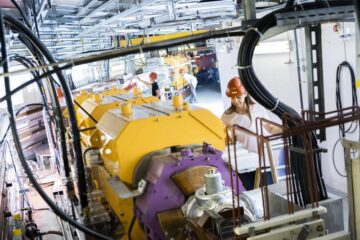Can Dungeness crab and eelgrass help improve management of our marine resources?

Guerry will discuss the use of ecosystem services, the benefits that people obtain from ecosystems, in managing marine resources in her AAAS presentation “Ecosystem Services Provided by the Nearshore in Puget Sound: An Analysis of Change.” Puget Sound is home to 200 species of fish, 26 species of marine mammals, and over 625 species of seaweed, as well as 3.5 million people. How well the marine systems in Puget Sound function is directly linked to the region’s quality of life and economy.
Guerry and colleagues focused on Dungeness crab harvests and the distribution of eelgrass, which sequesters or stores carbon from greenhouse emissions, as models to illustrate how changes in nearshore habitats and various management scenarios can affect these ecosystem services. By examining various scenarios that are based on real choices facing decision-makers, the team can compare the effects of various management decisions on the delivery of these services.
For example, Guerry’s team gathered basic life history information about Dungeness crab and data on its abundance and harvests in the region. Using a model of the crab populations in the sound, they examined its sensitivity to changes in nearshore habitats and the resulting changes in harvestable crab. Those changes can ultimately be translated to changes in the dollar value of the crab harvest, and tracked through economic models to changes in other sectors of the economy.
The researchers also examined the ecosystem service of carbon storage provided by eelgrass habitats in the nearshore region of Puget Sound and the potential for it to change under different management scenarios. They mapped current known distributions of eelgrass, looked at known historical distributions and places where eelgrass has the potential to grow. Next they mapped various human impacts on eelgrass habitats, from shoreline armoring with bulkheads to overwater structures that block light and mechanical damage by dredging.
“Making ecosystem services a useful concept to Puget Sound ecosystem management requires basic research on how services vary across the region and how they might be affected by alternative management schemes,” Guerry said. “The principles we use in Puget Sound can be applied to other regions.”
Media Contact
More Information:
http://www.NOAA.govAll latest news from the category: Ecology, The Environment and Conservation
This complex theme deals primarily with interactions between organisms and the environmental factors that impact them, but to a greater extent between individual inanimate environmental factors.
innovations-report offers informative reports and articles on topics such as climate protection, landscape conservation, ecological systems, wildlife and nature parks and ecosystem efficiency and balance.
Newest articles

Inverters with constant full load capability
…enable an increase in the performance of electric drives. Overheating components significantly limit the performance of drivetrains in electric vehicles. Inverters in particular are subject to a high thermal load,…

Combination of heavy ion therapy and mRNA vaccine
Joining forces for cancer research: TRON and GSI/FAIR study combination of heavy ion therapy and mRNA vaccine. It could be a new, promising combination of two therapeutic approaches and a…

Environmental changes influence microbial diversity
Adaptation as a strategy for survival: A new study from Jena University shows how microorganisms deal with environmental changes. Environmental changes influence microbial communities, which are crucial for the health…





















